Sometimes you understand that something just isn’t fair and decide that you won’t go down easily. And if you do go down, at least it will be swinging.
An EV owner on Reddit wanted to be compensated for driving to work fairly, at least charging costs, seeing as gas car owners got their gas paid for and even had some money left over.
The accountant they were dealing with wouldn’t level with them and said to read the laws if they weren’t satisfied. Well, they read those laws and came back – you guessed it – swinging.
More info: Reddit
A person saw how unfair the compensation processes were at their job and decided to fight it

Image credits: Karolina Grabowska (not the actual image)
Employees taking gas-powered cars were being compensated for driving to work about four times more than EV users
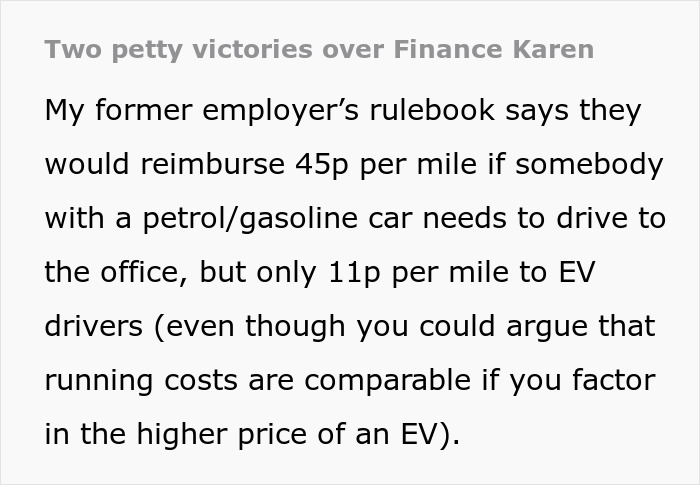

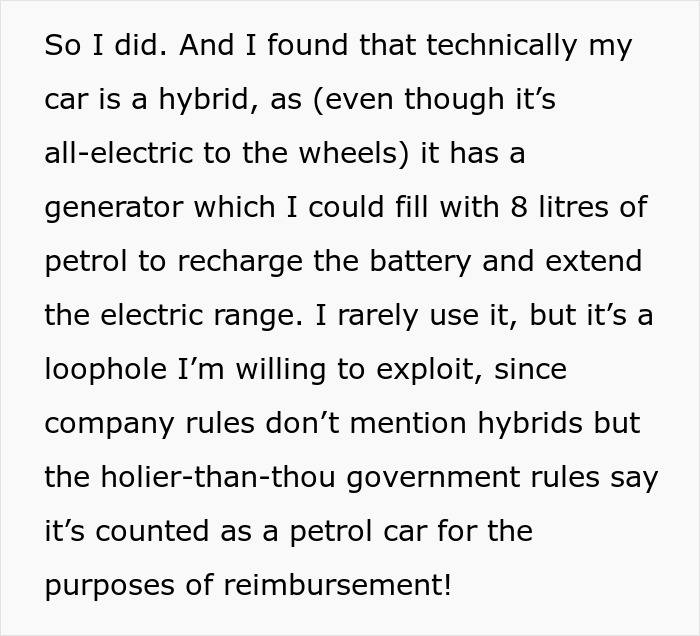
Image credits: u/beefjerk22
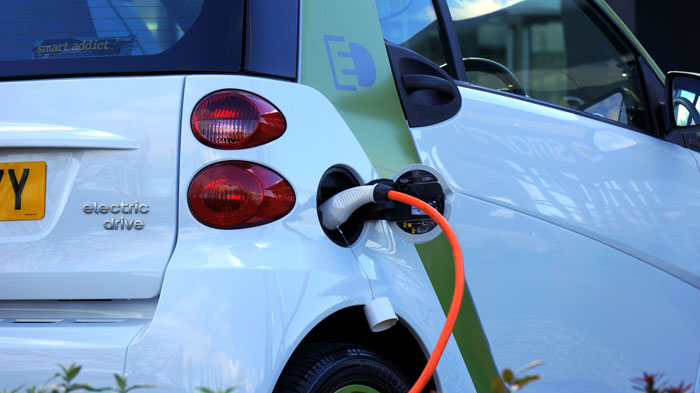
Image credits: Mike B (not the actual image)
The poster challenged this, but was quickly challenged by accounting, saying that their hands were tied and that they should “look it up” in the laws




Image credits: u/beefjerk22
When the poster looked at the laws, they saw their hybrid car should receive full compensation, same as gas-car drivers
The thing that sparked OP’s ire in this story is the simple fact that gas car drivers would be getting $0.56 per mile, while electric car owners, such as themselves, would get $0.14 for the same mile. Now that would be okay, but with electricity prices jumping, it costs from $0.16 to $0.31 per mile to charge that electric car, while gas cars cost less than $0.37 per mile.
Sorry for all those cent values, but I had to get that out of the way.
If you just tuned out for that bit, just know that OP was getting paid less than it costs to take their car to work because it’s an EV, while gas-powered car owners would be getting more than it costs, letting them pay for their gas and then having some extra cash left over.
OP wanted to correct this, so reached out to the finances department asking for more fair compensation, but was told “no can do, look up the laws.”
Well, they looked at said laws and found that even though their car was primarily electric, it was technically a hybrid, leading them to be entitled to the full $0.56 per mile compensation.
Accounting’s reaction to this was to attempt to take the compensation away completely, as they supposedly lived too close to work.
They showed management that during rush hour, it takes them the correct amount of time to get to work to be qualified for the compensation, so they stepped over accounting’s head and gave OP full compensation.
Double and not-so-petty win for them!

Image credits: cottonbro studio (not the actual image)
If it seems kind of unusual to you that people are getting paid for going into work – cue that “wait, you guys are getting paid?” meme – OP provides some more context about it in the comments.
In the UK it’s an allowable expense, if your workplace isn’t your “normal place of work.” As OP had been working from home, only visiting the office twice in 4 months of work, they were entitled to compensation.
And by-the-by, for all you car nuts out there – they’re driving a BMW i3 Rex, you’re welcome.
It turns out that there are a lot of misconceptions about electric vehicles out there. Which is not that surprising, if you consider that EVs became far more popular in the recent decades, especially since 2010; combined electric vehicle sales achieved 4 million units delivered globally in September 2016, breaking other usage number milestones in the last decade.
The United States Environmental Protection Agency (EPA) goes into further detail about some of the myths people still hold about EVs.
For example, people firmly believe that EVs are worse for the environment than gas-powered cars because of battery manufacturing. The fact is that greenhouse gas emissions related to an EV over its lifetime are usually lower than those from an average gas-powered vehicle. And that’s manufacturing emissions included.
Another myth is that EVs only come as sedans, which is also untrue, as they are now available in a wide variety of models. In the coming years, even more models are certain to be released, so if you’re thinking about purchasing, you may want to look into what’s coming out soon.
A huge and important one is that EVs don’t have enough range to cover daily use. In the US, a household’s typical daily travel is 50 miles. Furthermore, roughly 85% of households travel under 100 miles on a typical day. Current EV models go above 200 miles on a fully charged battery and even longer-range models are sure to come out soon.
The story was upvoted with a 97% upvote rate and collected about 6 thousand of them. In the 179 comments, people celebrated the poster, saying that it was superb malicious compliance. Have stories of your own or want to discuss EVs? The comments below are waiting for you!
Comments praised the poster’s victory and additional success of shutting the accountant down when she attempted to strip compensation entirely


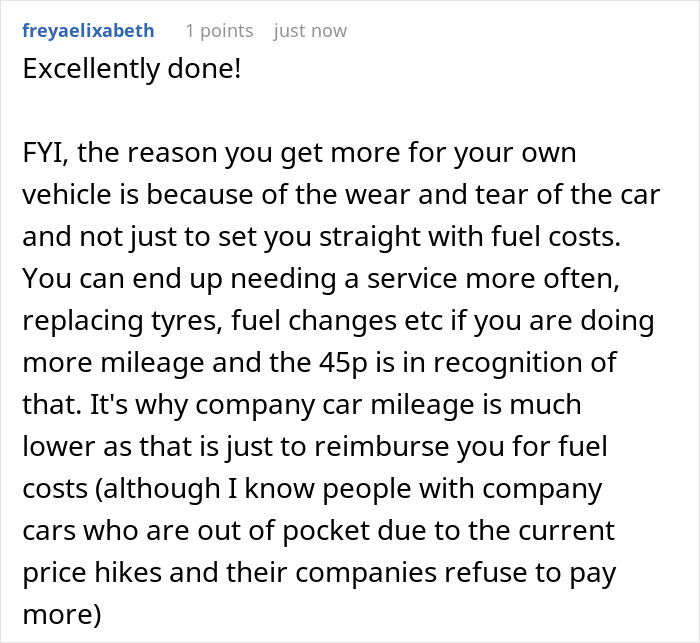
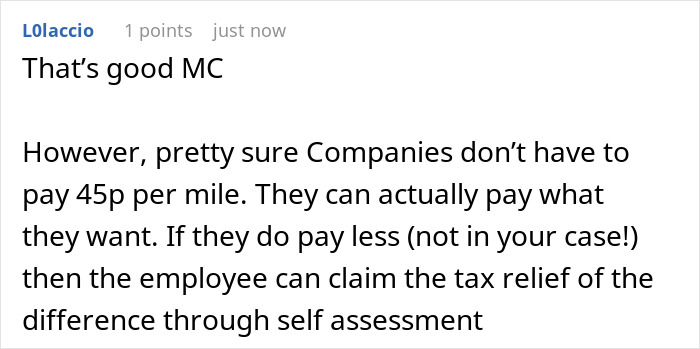

Image credits: Picas Joe (not the actual image)



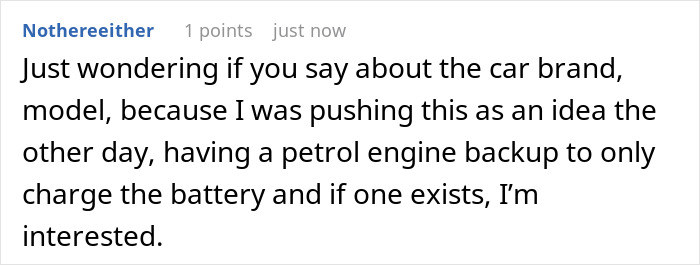


The post Finance Karen Refuses To Reimburse Person For Their Commute To Work Because “Rules Are Rules” So The Employee Makes The Rules Work For Them first appeared on Bored Panda.
source https://www.boredpanda.com/electric-car-money-work-karen/
ConversionConversion EmoticonEmoticon